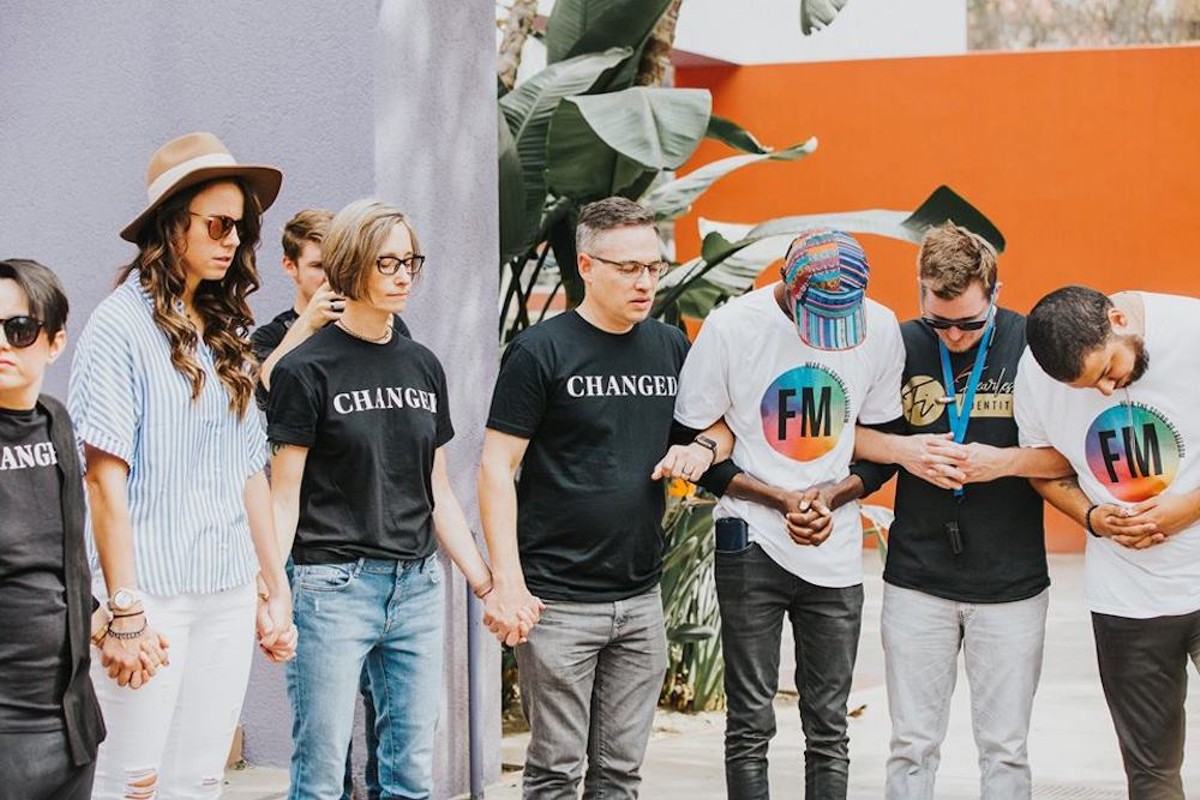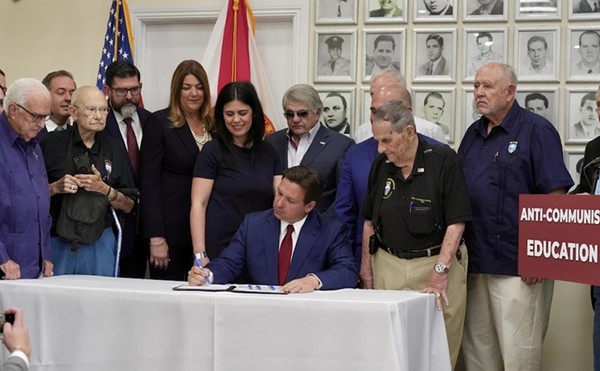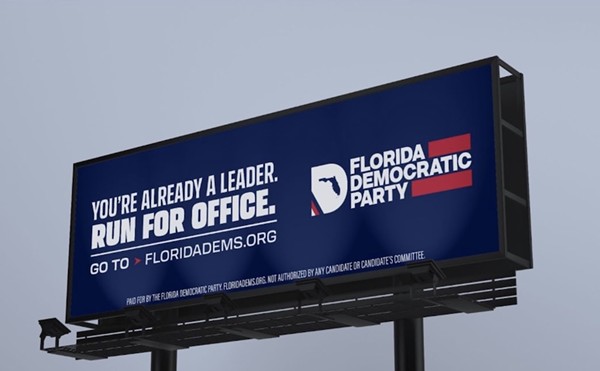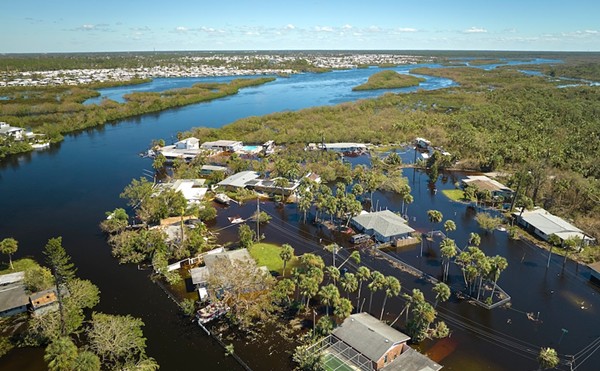It's been three years since Luis Javier Ruiz was trampled as he and other patrons scrambled to flee the Pulse nightclub. Three years since his foot got stuck in a fence, trying to get out. Three years since he waited for texts from friends, only to learn by watching the news they had died in the mass shooting.
And it's been roughly two years since he's stopped identifying as a gay man.
No, Ruiz says in a recent interview, he didn't "pray the gay away." No, he says, he doesn't support gay conversion therapy. And yes, he confirms, he's still attracted to men. But now he doesn't act on it.
In line with his faith, he's linked up with Freedom March, an organization that has recently launched a faith-based movement of people who have "turned away from homosexual lifestyles" due to their interpretation of the Christian scriptures. They're bringing one of their marches to Orlando this month, where more than a dozen people plan to give testimonies.
"I know a lot of people say, 'Well, it's PTSD,'" Ruiz, now 36, says. "I say, well, I'd rather have PTSD with Christ Jesus than PTSD without him."
Those involved with Freedom March – from Ruiz all the way to its founder Jeffrey McCall – say they don't condone conversion therapy. But LGBTQ members ask, how is the message any different?
Orlando-based community activist Eric Rollings says he wants to know "what their definition of conversion therapy really is." He says the rhetoric is just the first step in the process.
"If this isn't conversion therapy, then what do they call it?" Rollings asks. "If you're trying to get a bunch of people together to say 'don't be gay,' that's really the start of the conversion therapy explanation."
The Freedom March, organized by a collection of Christian groups, will take place at Lake Eola Park noon Saturday, Sept. 14. The event site describes the march as "a diverse group of former homosexuals and transgenders sharing our testimonies." The end of their online vision statement reads, "Freedom March is not about suppression. It's about FREEDOM."
"We are loving. You'll never see us with these signs saying homosexuals are going to hell," Ruiz says. "At the same time, we are individuals who don't compromise with what the gospel says."
The first march, held in May 2018 in Washington, D.C., brought out a small crowd and generated a New York Times column from LGBTQ advocate Julie Rodgers. In it, she revealed that not all conversion therapy is flat-out called conversion therapy. It's not all done behind the doors of a clinic. Some 18 states have completely banned conversion therapy, according to data from Movement Advancement Project. Still, those laws can't be applied to religious organizations, at the risk of infringing on First Amendment rights.
"Most conversion therapy occurs not with mental health professionals but in conservative Christian communities. Numbers are hard to come by, because the communities usually don't come out and say they're doing conversion therapy; in fact, they're often skeptical of therapy in general," Rodgers wrote. "Groups that help people 'leave homosexuality' are usually nonprofit ministries, and the counseling is facilitated by pastors and lay leaders who are not trained professionals. These groups are protected by religious freedom laws, so laws banning conversion therapy for minors do not apply to them."
Either way, Florida is not among the states with a ban. But State Sen. Jose Javier Rodriguez, D-Miami, filed legislation in the last legislative session to prohibit licensed practitioners from conducting therapy on youth. (It died in committee, but he has already refiled for next session.) His bill focuses on youth because "you can't undo somebody's sexual orientation. If you can, it should be voluntary."
"I want to persuade folks to accept LGBTQ youth," Rodriguez says by phone. "I can't legislate accepting LGBTQ youth. But what I can do is I can promote legislation that protects them."
The march, in an unrelated coincidence, will come four days after an Orlando-based LGBTQ movement will officially ask Orange County Mayor Jerry Demings and commissioners to put a conversion therapy ban ordinance on their agenda. Come Sept. 10, organizers with Convert to Love will make the formal request at the Orange County administration building, modeling their ordinance after a similar one in Alachua County.
Demings released a statement ahead of the march calling for unity.
"Orange County is proud to be an inclusive and welcoming community where all people are respected for who they are," his prepared statement reads. "We believe individuals and organizations should have the ability to express their First Amendment rights. We ask anyone attending the event, whether you support or oppose this issue, to be respectful of the community in our collective efforts to promote unity."
Freedom March founder Jeffrey McCall says he never underwent conversion therapy. Just three years ago, he says, he called himself Scarlet. Depressed and suicidal, according to McCall, Scarlet wanted surgery: breast implants and hip augmentation. She was seeing a psychologist and a psychiatrist, McCall says.
It was "a personal encounter with God" in 2016 that ended his identification as Scarlet, McCall tells Orlando Weekly, not counseling.
"What I believe is only through God's holy spirit can anyone transform or change. I believe that is the power and work of God, and not of man," McCall says. "As far as the old-school conversion therapy ... I don't believe in that. That doesn't have the power of God in it."
Soon after embracing his newfound faith, he was on tour: media interviews, television shows, radio shows, churches. There's a video feature on McCall from The 700 Club on the Christian Broadcasting Network, titled "From Transgender to Transformed."
If the 700 Club sounds familiar, it might be because its host, Pat Robertson, has often been quoted making outrageous statements about the LGBTQ community. Once, referring to Disney's Gay Days, Robertson said, "I would warn Orlando that you're right in the way of some serious hurricanes, and I don't think I'd be waving those flags in God's face if I were you. ... It'll bring about terrorist bombs; it'll bring earthquakes, tornadoes and possibly a meteor."
The church's relationship with the LGBTQ community is something Ruiz, along with fellow Pulse survivor Angel Colon, wanted to work on through their recently founded nonprofit, Fearless Identity. They visit churches and speak about themselves, their lives, and how to reach out to youth like them, Ruiz says.
"We're teaching the church how to love," he says. "We're teaching them how to understand the language and the culture of the LGBTQ, because I think the church has done a very bad job at it in the past."
As the Orlando Freedom March nears, the situation is delicate. LGBTQ activists with Convert to Love are not planning any counter-protests to the Freedom March, Rollings says. (The organization, of course, cannot vouch for other groups.)
"The last thing I want to do is get in an argument with a Pulse survivor on whether God can change you," Rollings says. "What I hope is they're not being used, because they're vulnerable. Some of these people can be very convincing and really make you feel like you're worthless unless you're straight."
Then again, the marches just started last year, and turnout remains low. Jennifer Foster, executive director of One Orlando Alliance, says it's better to not "call more attention to it than it deserves."
She instead points to a much different event coming to Orlando a month later.
"Come Out With Pride is expected to have 150,000 people in downtown Orlando in October. That's the kind of thing we wanted to focus on: celebrating diversity and celebrating inclusion," she says. "That's the beauty of our community. That's the true reflection of Central Florida right there."
– This story is from the Sept. 11, 2019, print issue of Orlando Weekly. Stay on top of Central Florida news and views with our weekly Headlines newsletter.



















